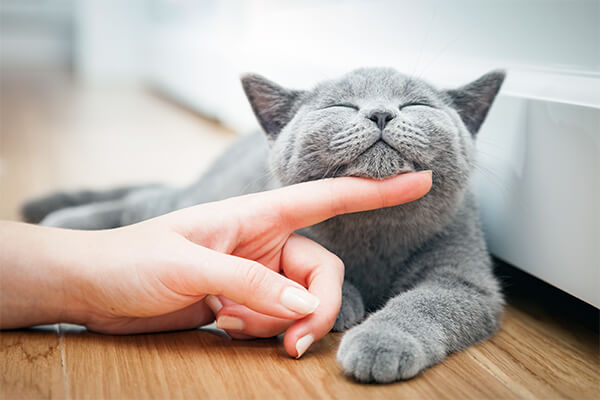- Homepage
- Blog
- Bonding & Care
- Why Do Cats Hiss
Why do cats hiss? Reasons and meaning


Share
Cats express their emotions through various behaviours. If you’re wondering why cats hiss, it’s often because your cat is feeling annoyed, distressed or scared. Not unlike snakes, cats hiss by releasing a sudden burst of air from their mouth, thus creating the impressive yet unnerving sound.
Oftentimes, cats may hiss at you or others as a warning that they’re not happy in the situation. However, there are other meanings to this behaviour which we explore in this article, alongside providing tips for handling a hissing cat. Understanding feline communication is crucial to create a safe environment for you, your cat and your household.
Cat hissing: what does it mean?
Contrary to common belief, a cat hissing is not an invitation to fight - in fact, the opposite is true. The reason why cats hiss is as a defence, in order to threaten others with their bare teeth and warn them to back off, without engaging in a physical altercation. In most situations, this signals that your cat is feeling uncomfortable.
However, there are other reasons why cats hiss, including pain or discomfort from an underlying illness. It’s also common for a female cat to hiss at potential threats to protect her kittens, while an unspayed or unneutered cat may hiss while seeking potential mates.
There are other key behaviours that may be observed with a hissing cat, such as:
- Open mouth
- Curled tongue
- Flattened ears
- Arched back
- Raised fur (piloerection)
- Flicking tail
Cat hissing is one type of feline communication, as cats vocalise their emotions in many other ways - learn more about why cats purr.
Why does my cat hiss at me?
Your cat may hiss at you for a number of reasons. Here are a few examples:
- If they’re feeling overwhelmed from a forced interaction, such as being petted when they want to be left alone, your cat may hiss at you as a warning sign to stop.
- If your cat is afraid of a new environment or unfamiliar situation, such as visiting the vet, they may hiss to express their fear.
- If they’re experiencing pain or discomfort, in which case you should consult a veterinarian.
It’s important to identify the possible triggers causing your cat to hiss at you. First and foremost, if your cat is hissing, you should immediately provide them with space. If you try to approach or punish your cat, this may increase their stress levels and lead to further aggression. By giving them space, as well as mitigating the trigger, your cat will feel more secure.
Cats have many interesting behaviours, and as a cat parent you may want to find out why cats lick you or why cats paw at you, to understand your feline friend better.
Why do cats hiss at each other?
Cats often hiss at each other as a way to communicate, usually either to establish boundaries or assert dominance. You may notice a hissing cat when another cat enters their environment, or if there’s a multi-cat household with limited resources, such as food, water and sleeping areas. By hissing, cats can warn the other cat to back off, without getting into a fight. Otherwise, if your cat is unspayed or unneutered, they may hiss at each other as a mating ritual, or hiss at other cats with whom they’re competing. A female cat with a litter may hiss at other cats that could be a threat to her kittens.
If you have a multi-cat household, make sure that each cat has ample space and resources to help ease any friction. If you’re bringing a new cat home when you already have cats, try to make a gradual introduction by keeping them separate at first and allowing time for familiarisation. It’s helpful to remember that generally, the hissing cat is usually one that is feeling unsettled, rather than being provocative. You can understand more about your cat’s mood through their body language, including why cats wag their tails.
Tips for handling a hissing cat
Regardless of whether a cat is hissing at you or another cat, it’s crucial to handle the situation effectively and safely using the following steps:
- Give your cat space. Any sudden movements could appear as an attack to your cat and cause more aggression.
- Understand why your cat is hissing by identifying their triggers. For instance, if you have children at home, supervise their interactions to ensure they’re being gentle and your cat isn’t getting frightened.
- Observe your cat’s body language from a distance and wait until they’re feeling more relaxed.
- Once they are receptive, you can try to offer a toy or treat to ease their tension, and approach them if it is safe to do so.
- Make sure that your cat has plenty of spaces to retreat to when they’re overwhelmed.
By mitigating your cat’s triggers, you can ease their tension and make them feel more comfortable. However, if you feel your cat is hissing regularly, or if their aggressive behaviours escalate, it’s essential to consult a veterinarian in case there is an underlying illness that is causing pain or discomfort.
Should I let cats hiss?
Yes, you should let cats hiss, because although it can be alarming, cat hissing is an entirely normal behaviour. It is a common form of communication for cats to let another cat, person or animal know that they are feeling overwhelmed, threatened or stressed, and to heed their warning.
However, in some situations, intervention may be necessary to avoid escalation, aggression and harm. While it’s important to not physically approach a hissing cat, you could try calming signals, like blinking slowly or yawning, or redirecting to a toy, to ensure the safety and well-being of all parties.
Understanding cat hissing
Understanding your cat’s behaviours and communication is important in order to respond appropriately to them. If you recognise why your cat hisses at you or others, manage their triggers and respond appropriately, you’ll be able to avoid situations that your cat finds stressful - or be better prepared instead. This, in turn, helps to foster a positive relationship with your cat companion, as they will trust you and feel more secure.
Besides cat hissing, there are many other vocalisations that cat parents can learn about. Check out our article on Cat Purring Loudly: Discover The Reason, to discover all the variations of cat purrs in different contexts.











